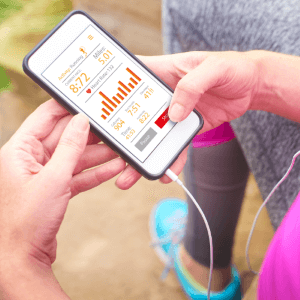The best way to make a healthy lifestyle easy is to keep it simple. Set achievable goals, don’t give yourself an overcomplicated regime to stick to, and integrate new habits gradually. The same goes for the tools you use.
There are thousands of healthy lifestyle apps out there, promising to change you for the better… but we’ve found that many of them feel over-engineered, and take up so much time that we’ve quickly abandoned them. Over the past couple of years we’ve tried out dozens, and have whittled them down to a few simple apps and calculators that are helping us stay on top of our goals…

Simple Calorie Counter
We don’t use calorie counting apps all the time, as they can easily take over your life. However, they are a great way to get yourself (back) on track if you need a wake-up call about how much you’re overeating. This super simple app is our favourite. Unlike many calorie apps, it’s not connected to an external food database. This means you don’t have to trawl through everyone else’s mystifying meal entries and unfamiliar groceries to find the food you’ve just eaten. Instead, the app simply remembers everything you add to it.
This does mean you need to find out the calorie content of what you’re eating, and add this to the app – but you only have to do this once per food. Every time you eat that food thereafter, it’ll be there waiting for you, in your own personal database. Given how often we eat the same things, this becomes a really simple solution. Calorie info is easily available on the sides of packets, or a with a quick search on the internet.
The app has a built-in calculator so you can easily work out multiples and divisions. There’s a “calorie goal” setting (which can be used as “eat less than” or “eat more than”) – use the NHS BMI Calculator (below) to determine how many calories you should be eating. We also like a visual bar chart which lets you take in your progress at a glance, give yourself a pat on the back for the times you’ve met your goal, and note when you tend to eat more than you need (often weekends, in our experience!). Remember to eat a balanced diet rather than focusing solely on the calorie numbers.
Couch to 5K
It’s true that some of us have restarted Couch to 5K – erm – more than once, now. Nevertheless, it’s a well designed way to get running, and we love the fact that you can listen to your own soundtrack while the app is in use. It’s also possible to use the programme as a set of podcasts, but these can’t be used alongside your own music. If you’re struggling to habituate regular runs, try going out for a walk three times a week, just to get yourself into the habit of leaving the house (with the added benefit of gathering useful info, such as when large groups of skateboarding teenagers tend to fill up your local park!). Then get your trainers on, load up some cheesy fitness music, and fill your neighbours with admiration. Perhaps you’ll even inspire them to join in…
NHS Tools Calorie Checker
You’ll find the calorie and fat content of most ingredients using a quick Google search, and packaged foods are usually well marked. However, takeaways and restaurant meals are harder to fathom. There is talk of making restaurants provide health info for the foods they serve, but this is a lot of work for restaurateurs and it may be some time before legislation is decided. In the meantime, the NHS Calorie Checker is a handy way to find out exactly how much chicken balti is too much chicken balti.
The Clue period tracking app
You may not be affected by hormone fluctuations, but for a lot of women progesterone equals fatigue, aches and mental health problems, sometimes to so severe that daily life is affected. Planning your life around your period is a pain, but it does mean a reduction in the disappointment and regret you might otherwise experience from changing plans at the last minute. Knowing that you’re feeling miserable or paranoid because of premenstrual dysphoria doesn’t make the feelings go away, but it can certainly help you stay self-aware about what’s going on.
The Clue app is part of a great project which feeds anonymous menstrual data from the app back to scientists who are working to improve women’s health. With simple buttons, you tell the app how you’re feeling, it learns your cycle, and starts to alert you when certain symptoms are likely to occur. You get the option to track the effect of behaviours such as exercise or partying. It predicts three months ahead, so you can book important events during your upbeat time of the month, and make sure you take it easy when you’re at a low ebb. The basic version is free, and ad-free, but we pay for ours because it’s a good cause.


